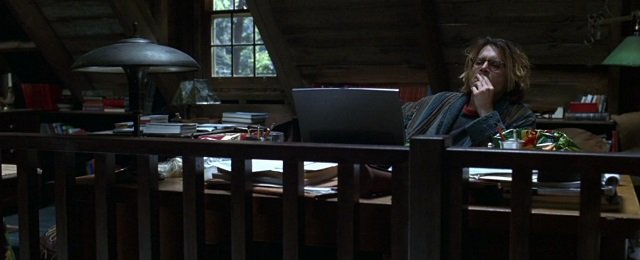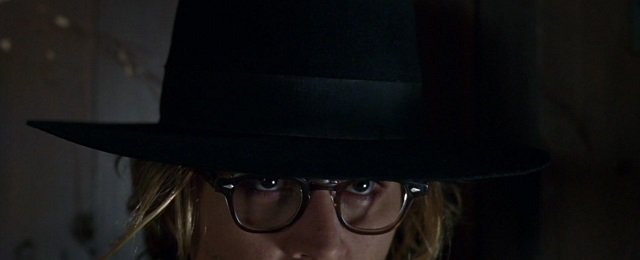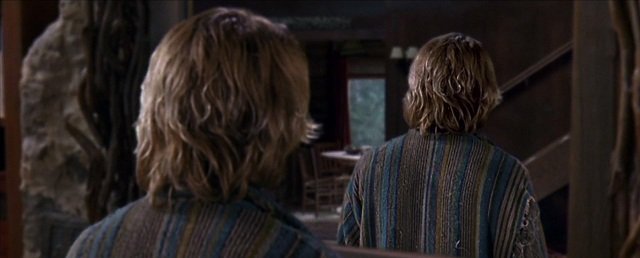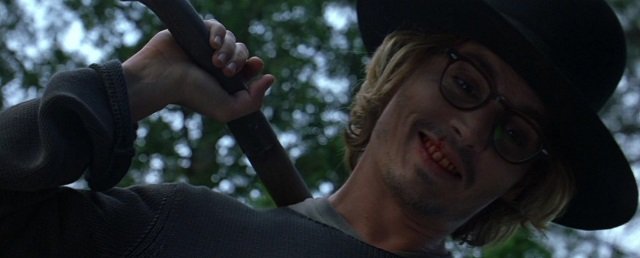Giving the perfect ending: The Secret Window (2004) [ING-ESP]


You know those movies where everything seems normal, but, little by little, reality starts to crack? Well, David Koepp brings us an original story by Stephen King: The Secret Window, and it's just that, a story that becomes distorted. With a Johnny Depp at his most introspective and half disheveled (making his personal trademark clear); which, to be honest, in any of its stages, I find a visual delight. This comes with a lot of spoilers, so if you haven't seen it (which I doubt), it's at your own risk.

¿Recuerdan esas pelis donde todo parece normal, pero, poco a poco, la realidad se empieza a resquebrajar? Bueno, David Koepp nos trae una historia original de Stephen King: La ventana secreta, y es justo es eso, una historia que se va distorsionando. Con un Johnny Depp en su fase más introspectiva y medio desaliñado (dejando bien en claro su marca personal); que, siendo sincera, en cualquiera de sus etapas, me resulta un deleite visual. Esto viene con muchos spoilers, así que si no la han visto (que lo dudo), es a tu propio riesgo.



What's it about?
Mort Rainey (Johnny Depp) is an acclaimed writer, but half bitter, locked in a cabin after a recent separation. He's in the middle of a creative crisis. Suddenly a strange guy, John Shooter, appears, accusing him of having stolen a story.
So far, everything seems to be going in the direction of a classic thriller. But what starts out as a copyright dispute turns into something much more sinister, like a downward spiral into Mort's mind.

¿De qué va? Sin tantas vueltas
Mort Rainey (Johnny Depp) es un escritor reconocido, pero medio amargado, encerrado en una cabaña tras una separación reciente. Está en plena crisis creativa. De repente aparece un tipo rarísimo, John Shooter, acusándolo de haberle robado un cuento.
Hasta ahí, todo parece ir en la dirección de un thriller clásico. Pero lo que empieza como una discusión por derechos de autor se va transformando en algo mucho más siniestro, como una espiral descendente hacia la mente de Mort.



Double-bottom cinema.
The grace of this film is in its deception. The viewer thinks he is watching a story about plagiarism and revenge, but in reality he is watching a story about dissociative identity, guilt, and denial of reality. Because. John Shooter does not exist. He is a creation of Mort's fragmented mind.
Everything we see are, in reality, expressions of his mind collapsing. Shooter is his alter ego, like the “dark side” of his personality that emerges when he can no longer cope with the pain, guilt and frustration. Yes, in a way, it becomes like his “defense mechanism”, albeit a very strange one.

Cine de doble fondo.
La gracia de este film, está en su engaño. El espectador cree que está viendo una historia sobre plagio y venganza, pero en realidad está viendo una historia sobre identidad disociativa, culpa, y negación de la realidad. Porque... John Shooter no existe. Es una creación de la mente fragmentada de Mort.
Todo lo que vemos son, en realidad, expresiones de su mente colapsando. Shooter es su alter ego, como el “lado oscuro” de su personalidad que emerge cuando ya no puede más con el dolor, la culpa y la frustración. Sí, de cierta forma, se vuelve como su “mecanismo de defensa”, aunque una muy extraña.



What happens to Mort?
Isolation and denial: Mort takes refuge in a cabin almost in the middle of nowhere; and his ex-wife mentions it to him, if something were to happen to him, no one would know. He is literally running away from the world. But if we think about it, he is locked in his head, alone, with no real contact with people. The separation with his wife, the creative block, his neglected appearance... it all adds up to a strong depressive picture.
Projection of internal conflict: Shooter is not just a hallucination, it is a way for Mort to bring out his own violent and resentful tendencies. In other words: “it wasn't me, it was Shooter”.
Mental gaps: There are times when Mort loses track of time, doesn't remember things, or acts as if he's been possessed. This fits with a dissociative disorder, where the person creates an alternate identity to deal with a trauma or conflict.
Extreme guilt: He knows, deep down, that his marriage failed because of his lack of commitment, and that his talent was plummeting. Instead of coming to terms with it, his mind creates a kind of poetic justice where Shooter comes to punish him.

¿Qué le pasa a Mort?
Aislamiento y negación: Mort se refugia en una cabaña casi que en medio de la nada; y su ex esposa se lo menciona, si algo le pasara, nadie se enteraría. Está literalmente huyendo del mundo. Pero si lo pensamos bien, está encerrado en su cabeza, solo, sin contacto real con la gente. La separación con su esposa, el bloqueo creativo, su aspecto abandonado… todo suma a un cuadro depresivo fuerte.
Proyección del conflicto interno: Shooter no es solo una alucinación, es una forma de que Mort saque sus propias tendencias violentas y resentidas. Es decir: "no fui yo, fue Shooter".
Lagunas mentales: Hay momentos en los que Mort pierde la noción del tiempo, no recuerda cosas, o actúa como si hubiera estado poseído. Esto encaja con un trastorno disociativo, donde la persona crea una identidad alternativa para lidiar con un trauma o conflicto.
Culpa extrema: Él sabe, en el fondo, que su matrimonio fracasó por su falta de compromiso, y que su talento iba en picada. En lugar de asumirlo, su mente crea una especie de justicia poética donde Shooter viene a castigarlo.



Little evidence.
Shooter's hat: classic symbol of a separate identity. The weird thing is that Mort tries it on and likes it. It's not just a coincidence: he's integrating it.
The stolen story: the story that Shooter claims from Mort is already published by Mort. But Shooter says he wrote it before, but never published it. This doesn't really make sense... unless we understand that it's all part of Mort's mind trying to convince himself that he's the imposter, not the real writer. It's an internal struggle for authorship of his own identity.
The line of the story: “the most important part is the ending”. Pff! This sentence is like a ticking time bomb. Mort is obsessed with closing the story well. Not just the story, but his own internal story. And so he rewrites the ending of his life, killing his ex-wife and the new boyfriend, as if that ending “fixes everything”. And it really fills him with great pride and satisfaction.

Pequeñas evidencias.
El sombrero de Shooter: clásico símbolo de una identidad aparte. Lo raro es que Mort se lo prueba y le gusta. No es solo una coincidencia: lo está integrando.
El cuento robado: la historia que Shooter le reclama a Mort, ya está publicado por Mort. Pero Shooter dice que él lo escribió antes, más nunca lo publicó. Esto realmente no tiene sentido... salvo que entendamos que es todo parte de la mente de Mort intentando convencerse de que él es el impostor, no el escritor verdadero. Es una lucha interna por la autoría de su propia identidad.
La frase del cuento: "la parte más importante es el final". ¡Uff! Esta frase es como una bomba de tiempo. Mort está obsesionado con cerrar bien la historia. No solo la del cuento, sino su propia historia interna. Y por eso reescribe el final de su vida, matando a su exesposa y al nuevo novio, como si ese final “arreglara todo”. Y realmente lo llena de gran orgullo y satisfacción.



A twist.
The ending is not a simple “surprise, it was the same guy!”, as happens in some half-cheating narratives. Here the twist is more of a confirmation. The viewer already suspected that there was something a bit off with them, but what hurts is to see it so explicit: Mort completely surrenders to his other identity. There is no more guilt, no more denial. There is acceptance of the chaos.

Un giro.
El final no es un simple "¡sorpresa, era el mismo tipo!", como pasa en algunas narrativas medio tramposas. Acá el giro es más una confirmación. El espectador ya sospechaba que había algo medio raro con ellos, pero lo que duele es verlo tan explícito: Mort se entrega completamente a su otra identidad. Ya no hay culpa, ya no hay negación. Hay aceptación del caos.



Why does it grab us so much?
Because we all have a “Shooter” inside. Not with a hat and a southern accent, obviously, but with forms of self-sabotage, dark thoughts, parts of us that we don't want to accept. The Secret Window plays with that: the fine line between control of our mind and imminent overflow.

¿Por qué nos atrapa tanto?
Porque todos tenemos un "Shooter" adentro. No con sombrero y acento sureño, obvio, pero sí con formas de autosabotaje, pensamientos oscuros, partes de nosotros que no queremos aceptar. La ventana secreta juega con eso: la delgada línea entre el control de nuestra mente y el desborde inminente.



In conslusion, is it a great movie? There are good reviews and bad reviews. Many believe that it is not at the level of other psychological thrillers, but personally, I loved it (and not only because it stars my husband 🤤), Koepp really knew how to convey a good story. Is it interesting psychologically? Yes, of course it is. Especially if you like to see how a mind can slowly break down and lie to itself. And one of the things you like most about this film is that you can watch it several times and each time you will discover details you didn't see before. A good move and an excellent excuse that I love to use to watch it again; so (my closing fitting like a glove), as I always say: “If you haven't seen it, see it, and if you have already seen it, see it again, you can't miss it at all”.

En resumen, ¿Es una gran película? Existe críticas buenas y otras malas. Muchos creen que no está al nivel de otros thrillers psicológicos, pero en lo personal, me encantó (y no solo porque la protagonice mi esposo 🤤), realmente Koepp supo transmitirnos una buena historia. ¿Es interesante psicológicamente? Sí, obvio. Especialmente si te gusta ver cómo una mente puede irse quebrando poco a poco y llegar a mentirse a sí misma. Y una de las cosas que más gustan de este film, es que puedes verlo varias veces y en cada oportunidad descubrirás detalles que no viste anteriormente. Una bueno jugada y una excelente excusa que me fascina usar para verla nuevamente; así que (mi cierre encajando como anillo al dedo), como siempre les digo: “Si no la han visto, véanla, y si ya la vieron, vuélvanla a ver, no tiene pérdida de nada”.



Thank you for coming here and reading me. | Gracias llegar hasta aquí y leerme.
🖤
Images taken from (Imágenes tomadas de) IMDb + Traducido con www.DeepL.com/Translator (versión gratuita)
No me gustan mucho los thrillers psicológicos, aunque he visto algunas del género que si me han gustado...
Si actúa Johnny Depp, no tengo dudas que es una película que me puede llegar a encantar. Este actor siempre realiza una con caracterización y actuación con sus personajes. Saludos.
This is a nice movie. A nice little thriller, watched it a couple times many years ago.
As a Stephen King adaptation it's not surprising that the story is quite compelling, of course.
Johnny Depp and Turturro were both great in it!
Well spotted with the hat. Definetely a detail I didn't catch.
And nicely written review too! 😉